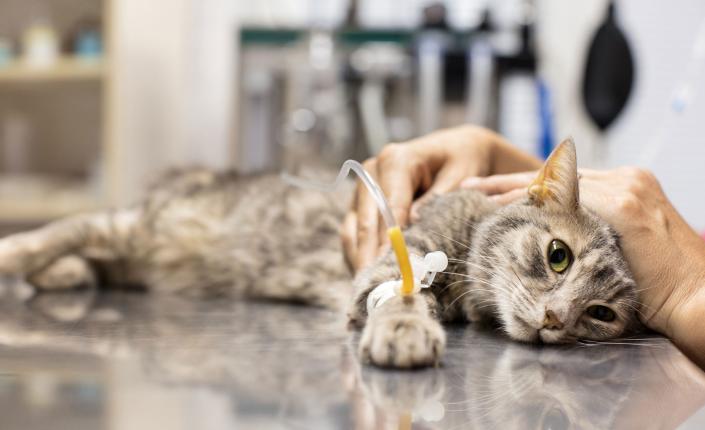Case of the Month: Feline Infectious Peritonitis

Rosie’s Story*
Last fall, Rosie and her family moved to a new home. Shortly after the move, Rosie became lethargic, and progressively lost her appetite. At first, her family thought the stress of the move was affecting her. However, as the symptoms continued, they became worried and brought Rosie to her primary veterinarian. Some liver abnormalities were noted on bloodwork, and Rosie was treated with fluids, antibiotics, and appetite stimulants. While these measures appeared to work for a short time, Rosie eventually went off her food again. Despite her weight loss, Rosie’s belly started to look bloated. She was taken to a specialist veterinary hospital where anemia and an abdominal fluid accumulation was discovered. Tests were run, and Rosie was diagnosed with Feline Infectious Peritonitis.
About the Condition: Feline Infectious Peritonitis (FIP)
Feline Infectious Peritonitis (FIP) is a serious illness caused by a mutation of the feline coronavirus. While most cats infected with feline coronavirus show mild symptoms or remain asymptomatic, a small percentage develop FIP, the mutated form of the virus. This disease is most commonly seen in kittens and young cats, as well as those living in multi-cat environments.
FIP affects the immune system, leading to severe inflammation in various organs and blood vessels. The disease can present in two forms:
- Wet FIP: Characterized by fluid buildup in the chest or abdomen, causing breathing difficulties or a swollen belly.
- Dry FIP: Causes granulomas (inflammatory masses) in organs like the liver, kidneys, or brain, leading to neurological or systemic symptoms.
Symptoms of FIP include:
- Fever that doesn’t respond to antibiotics
- Loss of appetite and weight loss
- Lethargy
- Swollen abdomen or difficulty breathing (wet form)
- Neurological signs like seizures or uncoordinated movement (dry form)
- Ocular disease
Treatment
FIP was historically considered fatal, but recent advances in antiviral treatments have shown promise in managing the disease. Treatment typically involves:
- Antiviral medications: Such as GS-441524, which targets the mutated virus.
- Supportive care: Including fluids, appetite stimulants, and medications to reduce inflammation and manage secondary symptoms.
Early diagnosis and treatment are crucial to improve outcomes. While FIP remains a challenging condition, advances in veterinary medicine offer hope for affected cats and their owners.
Rosie required hospitalization for several procedures to drain excess fluid from her chest and abdomen. She was given IV fluids, antibiotics, and blood transfusions to help her through her crisis. Most importantly, she was started on the revolutionary drug, GS-441524 to treat her viral infection.
Claim Outcome
Rosie’s committed family and intensive veterinary care allowed her to survive an illness that was considered terminal just a few years ago. But the cost of cutting-edge veterinary care can be substantial. Her care has cost more than $21,000.00** so far. Her family’s Pets Plus Us Accident and Illness More policy has reimbursed the policy’s annual maximum limit of $7,500 to help with those costs, and will continue to help next year.
**Sample claim for illustrative purposes - details have been changed for privacy. Based on 2024 PTZ Insurance Services Ltd. actual claims data. Dollar amounts have been rounded down.